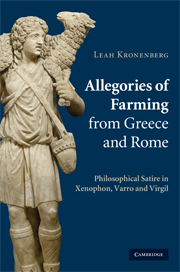Book contents
4 - The morality of farming
from PART II - VARRO'S DE RE RUSTICA
Published online by Cambridge University Press: 03 May 2010
Summary
In Greek and Roman satire and comedy, the city is the place of vice and the country the place of virtue. These genres pick up on the moralizing tendencies of their cultures and decry the greed and luxury of the city as opposed to the country, as well as the loose morals of the modern age as compared with those of the past. That said, moralizing in satire and comedy often has an ironic edge, and the moralizing characters frequently appear hypocritical or are somehow undermined in the course of the work. Recent studies have located this kind of ironic moralizing in Horace's and Juvenal's Satires and the plays of Plautus, as well as in Varro's Menippean Satires; however, the moralizing of the De Re Rustica has generally been taken at face value. I hope to show that Varro undermines moralizing in this work, too, and that he also undermines the conventional morality of Roman culture. There is again a humorous and a serious aspect to Varro's satire as he reveals that behind the Roman esteem of farming lies a profit-motive that is at the core of the Roman value system.
GENEALOGY OF MORALS
In the preface to the De Agri Cultura, Cato equates farming with a moral lifestyle: he says that when the Roman ancestors wanted to praise a “good man” (virum bonum), they would call him a “good farmer and husbandman” (bonum agricolam bonumque colonum, pr. 2) and that farming is an “especially moral source of income” (maximeque pius quaestus, pr. 4).
- Type
- Chapter
- Information
- Allegories of Farming from Greece and RomePhilosophical Satire in Xenophon, Varro, and Virgil, pp. 94 - 107Publisher: Cambridge University PressPrint publication year: 2009

